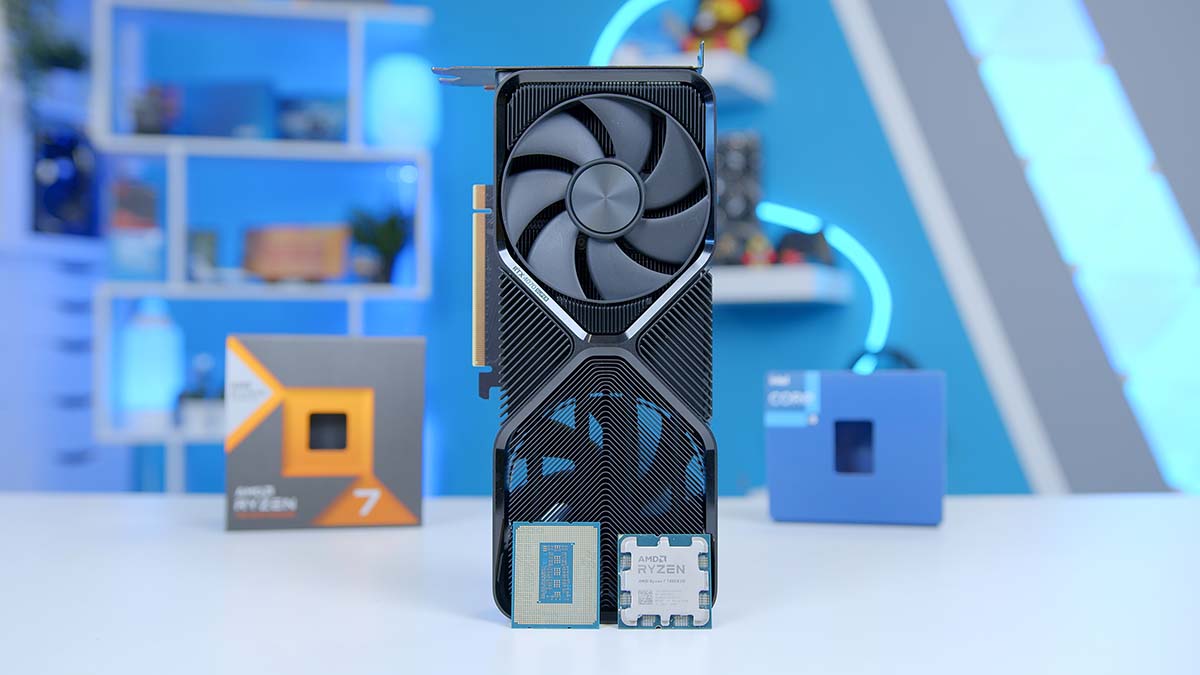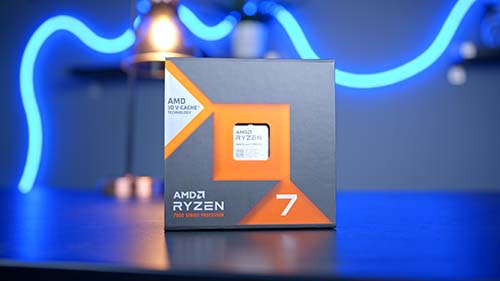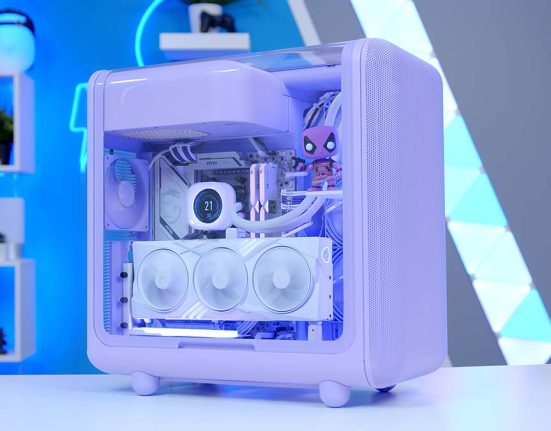The RTX 4070 SUPER is NVIDIA’s answer to AMD’s significant rise within the 1440p market. This GPU offers a 10-15% performance bonus over the standard RTX 4070, and competes directly with the RX 7800 XT, while coming in at a slightly higher price point. However, picking a CPU to pair up with the RTX 4070 SUPER can be a difficult task due to the myriad of options available on the market. So how do you figure out which is the best CPU to buy for the RTX 4070 SUPER?
To determine which is the best CPU to pair up with the RTX 4070 SUPER, we’ve tested and benchmarked a plethora of options that we believe are the best selections geared towards a range of buyers.
The Best CPUs for the RTX 4070 SUPER
1. AMD Ryzen 7 7800X3D

AMD’s Ryzen 7 7800X3D is one of the biggest competitors on the market, making it an excellent option to pair up with the RTX 4070 SUPER. The 3D V-Cache technology that this processor uses makes reading and executing instructions much quicker, creating a resultant uplift in performance within modern games. Regardless of whether you’re playing at 1440p or 4K, the Ryzen 7 7800X3D can handle it.
With 8 cores and 16 threads, the Ryzen 7 7800X3D offers decent performance within some multi-core workloads too. Admittedly there are stronger options out there with more cores, but the performance is difficult to argue with at such a competitive price point.
The thermal performance of the Ryzen 7 7800X3D shouldn’t pose any issues either. We found the Ryzen 7 7800X3D to be pretty efficient across the board drawing less than 100W during all-core workloads, which makes it one of the stronger options when it comes to power draw.
| Key Specs | AMD Ryzen 7 7800X3D |
|---|---|
| Core Count | 8 |
| Thread Count | 16 |
| Base Clock Speed | 4.2GHz |
| Boost Clock Speed | 5GHz |
| Max Cache | 104MB |
| Default TDP | 120W |
| CPU Socket | AM5 |
| Overclockable | No |
In terms of overclocking capability, the ‘3D’ range of Ryzen 7000 CPUs does not offer official overclocking support. However, you can achieve a slight boost to performance with PBO. It is worth noting that this will require a relatively strong cooler to ensure temperatures stay low.
The biggest drawback of the Ryzen 7 7800X3D is the application of 3D V-Cache. While the cache does improve performance within top-end gaming, day-to-day usage and threaded workloads won’t see any uplifts. For this reason, those planning on pushing their system with a bit more than gaming will want to take a look at alternative options with better core counts.
Suggested Article: Best Power Supplies for the RTX 4070 SUPER
2. Intel Core i5-14600K

Intel’s Core i5-14600K is a modern alternative to the Ryzen 7 7800X3D, especially if you’re looking for a stronger multi-core option. The Core i5-14600K comes in with 14 cores and 20 threads, at a boost clock speed of 5.3GHz. This makes it ideal for top-end gaming, but the Core i5-14600K is also well equipped to handle threaded applications that require more cores.
It is worth noting, that while our initial review of the Core i5-14600K isn’t worth upgrading to if you’re using a Core i5-13600K, the Core i5-14600K is definitely worth considering if you’re a new PC builder. The Core i5-13600K is cheaper by a small margin, but Intel’s Core i5-14600K is the most modern option and does offer the strongest performance of the two.
In terms of pricing, the Core i5-14600K sits around the $320 mark, which puts it somewhat below the 7800X3D, making it ideal for price conscious buyers. The Core i5-14600K does offer overclocking capabilities (denoted by the ‘K’ at the end of the name). This means you’ll be able to increase the rated boost speed of this CPU, providing some performance uplifts across your favourite games.
| Key Specs | Intel Core i5-14600K |
|---|---|
| Core Count | 14 |
| Thread Count | 20 |
| Base Clock Speed | 4GHz |
| Boost Clock Speed | 5.3GHz |
| Max Cache | 44MB |
| Default TDP | 125W |
| CPU Socket | LGA 1700 |
| Overclockable | Yes |
Admittedly, the thermal capability of the Core i5-14600K is its biggest drawback versus other options. The Core i5-14600K can draw close to 175W during an all-core workload, resulting in high thermals. Needless to say, if you’re planning on pushing your system with some tougher applications, you’ll want to pick up a decent cooler to keep temperatures down.


3. AMD Ryzen 7 7700X

AMD’s Ryzen 7 7700X is a great CPU, offering similar performance to the Core i5-14600K. This 8 core 16 thread CPU is extremely capable of handling 1440p and 4K gaming, which is more than achievable with the RTX 4070 SUPER. The Ryzen 7 7700X isn’t specifically geared towards threaded workloads, but it does have some decent legs within these tougher applications.
Although the Ryzen 7 7700X does come in at a marginally higher price point in comparison to the Core i5-14600K, the performance and efficiency that this CPU offers is well worth it. The Ryzen 7 7700X sits around 147W at its peak power draw, which is considerably lower than the near 175W that the 14600K outputs. This CPU is also overclockable through the AMD Ryzen Master software, allowing you to easily apply a boost to your performance with minimal hassle.
| Key Specs | AMD Ryzen 7 7700X |
|---|---|
| Core Count | 8 |
| Thread Count | 16 |
| Base Clock Speed | 4.5GHz |
| Boost Clock Speed | 5.4GHz |
| Max Cache | 40MB |
| Default TDP | 105W |
| CPU Socket | AM5 |
| Overclockable | Yes |
Much like the Core i5-14600K, the main weakness of the Ryzen 7 7700X is thermals. Ryzen 7000 CPUs will reach their thermal limit before the boost speed kicks in, which results in higher temperatures across gaming and threaded workloads. For this reason, it is pivotal that you pick up a good CPU cooler to offset the thermals that the Ryzen 7 7700X outputs.


4. AMD Ryzen 5 7600X

AMD’s Ryzen 5 7600X is a popular CPU within the 1440p and 4K markets, as this CPU is more than capable of handling top-end games, despite being an entry-level processor. The reason why the Ryzen 5 7600X is such an awesome budget CPU comes down to its single core boosting capability. In games that limit the cores you can use, the 7600X is able to boost nearly all the way up to its rated speed of 5.3GHz, resulting in solid framerates across a number of titles.
The Ryzen 5 7600X is also fully overclockable, allowing you to push this rated boost speed even further with some trial and error. This does mean your thermals might get a little bit toasty, but the power draw and efficiency of the Ryzen 5 7600X shouldn’t pose any problems.
| Key Specs | AMD Ryzen 5 7600X |
|---|---|
| Core Count | 6 |
| Thread Count | 12 |
| Base Clock Speed | 4.7GHz |
| Boost Clock Speed | 5.3GHz |
| Max Cache | 38MB |
| Default TDP | 105W |
| CPU Socket | AM5 |
| Overclockable | Yes |
While the gaming performance of the Ryzen 5 7600X is very solid, threaded performance is the biggest caveat to consider. The 6 cores and 12 threads that the Ryzen 5 7600X offers will cope with some more intense workloads. However, there are a myriad of better options that offer higher core counts designed to handle threaded applications that we’d recommend considering.


How We Tested the Best CPUs for the RTX 4070 SUPER
Providing informed product recommendations requires a mass of data so that we can assess value proposition and performance. All of the CPUs within this roundup have been tested rigorously within a range of games and threaded workloads at alternating resolutions and settings. To ensure our testing is far and repeatable, we’ve detailed all of the settings that we use in a how we test CPUs article. There you’ll find an in-depth run down of our full testing suite for CPUs.
Frequently Asked Questions
Do I Need DDR4 or DDR5 RAM?
AMD Ryzen 7000 CPUs only support DDR5 RAM, while Intel’s 14th-Gen options support DDR4 and DDR5 memory.
What Power Supply Do I Need for the RTX 4070 SUPER?
The RTX 4070 SUPER has a power draw of 220W, with a recommendation of 650W or higher as your PSU wattage.
How Many CPU Cores Do I Need for Gaming?
Most games will only ever use 2-4 CPU cores at once, so if you’re just gaming you don’t need a CPU with a high core count.







![FI_[DM89] Phanteks Evolv + AORUS 5090 9850X3D Gallery (8)](https://geekawhat.com/wp-content/uploads/2026/02/FI_DM89-Phanteks-Evolv-AORUS-5090-9850X3D-Gallery-8-551x431.jpg)
![FI_[DM88] 16GB DDR5 9060 XT Build Gallery](https://geekawhat.com/wp-content/uploads/2026/02/FI_DM88-16GB-DDR5-9060-XT-Build-Gallery-551x431.jpg)

![FI_[DM87] HAVN BF & RTX 5090 Build](https://geekawhat.com/wp-content/uploads/2026/01/FI_DM87-HAVN-BF-RTX-5090-Build-551x431.jpg)

![FI_[DM86] Montech King 45 Pro + RX 9070](https://geekawhat.com/wp-content/uploads/2026/01/FI_DM86-Montech-King-45-Pro-RX-9070-551x431.jpg)